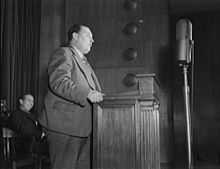Leon Henderson

Leon Henderson (1895 - 1986) was the administrator of the Office of Price Administration from 1941 to 1942.
Life and career
Henderson was born in Millville, New Jersey, where he attended Millville High School, and later Swarthmore College.[1][2] He was an official of the Russell Sage Foundation from 1925 to 1934.
Henderson worked as an economic adviser in President Franklin Roosevelt's administration before he was appointed to the Securities and Exchange Commission in 1939.[3] In 1941 he became head of the Office of Price Administration. His tenure there was controversial and he was deeply unpopular, especially with the Farm lobby.[4] Edwin W. Pauley, secretary of the Democratic National Committee in 1942 listed five factors for the Democratic loss in the 1942 election, and resentment of Leon Henderson was listed as one of the top five reasons for that defeat. As he wrote, "This was the most universal and serious complaint of all . . . It appears from the letters that the complaint is directed rather at Mr. Henderson and his attitude and methods than at the abstract question of . . . rationing and price control . . . ."[5] That defeat ensured that no more New Deal social measures would be passed by the US during World War II, and that many of them would be repealed.
Leon Henderson was replaced after the 1942 election and went into a career in business.
He died in 1986. Before his death, he personally donated many of his papers to the Franklin D. Roosevelt Presidential Library.
References
- ↑ "Up Again Henderson", Time (magazine), May 1, 1939. Accessed October 1, 2007. "As a boy out of Millville, N. J., he worked his way through Swarthmore College, played basketball and football there."
- ↑ Our People of the Century - Millville's Class of 1913: Fame, Power, Influence Await Three High School Graduates", Cumberland County, New Jersey. Accessed December 6, 2007. "The legendary Millville High School Class of 1913 turned out a business leader, a political leader, and a religious leader. Collectively known as the “Big Three,” William M. Dougherty, Leon Henderson, and Bishop Fred Pierce Corson, all schoolboy chums, went on to shape a good chunk of 20th century America."
- ↑ Herman, Arthur. Freedom's Forge: How American Business Produced Victory in World War II, p. 70, Random House, New York, NY. ISBN 978-1-4000-6964-4.
- ↑ Herman, Arthur. Freedom's Forge: How American Business Produced Victory in World War II, pp. 153, 162, 198, Random House, New York, NY. ISBN 978-1-4000-6964-4.
- ↑ Blum, John Morton. _V Was For Victory_. New York, Harcourt Brace Jovanovich, 1976. Pg 233.
External links
|